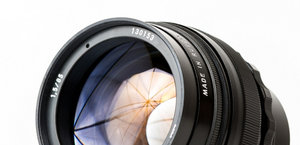Olympus M.Zuiko Digital ED 17 mm f/1.2 PRO
8. Vignetting
| Olympus E-M5 II, JPEG, f/1.2 | Olympus E-M5 II, JPEG, f/1.4 |

|

|
| Olympus E-M5 II, JPEG, f/2.0 | Olympus E-M5 II, JPEG, f/2.8 |

|

|
At the maximum relative aperture the vignetting reaches 33% (−1.14 EV). For this angle of view and aperture fastness, it is not a result you should criticize, especially that by f/1.4 and f/2.0 the aberration decreases to 28% (−0.93 EV) and 19% (−0.60 EV) respectively. By f/2.8 and f/4.0 apertures the problem disappears practically completely because we got the following light fall-off values: 13% (−0.42 EV) and 8% (−0.26 EV) respectively.
Please Support UsIf you enjoy our reviews and articles, and you want us to continue our work please, support our website by donating through PayPal. The funds are going to be used for paying our editorial team, renting servers, and equipping our testing studio; only that way we will be able to continue providing you interesting content for free. |
- - - - - - - - - - - - - - - - - - - - - - - - - - - - - - - - - - - - - - - - - - - - - - - -
As the optics of the Olympus 1.2/17 is burdened with significant distortion that aberration is corrected by the software of the camera and then, while transforming images to JPEG format, they have to be cropped. The operation influences vignetting so it is worth checking how that aberration looks in non-modified RAW files – appropriate thumbnails can be found below.
| Olympus E-M5 II, RAW, f/1.2 | Olympus E-M5 II, RAW, f/1.4 |

|

|
| Olympus E-M5 II, RAW, f/2.0 | Olympus E-M5 II, RAW, f/2.8 |

|

|
In this case vignetting is a bit higher but still doesn’t deserve to be criticized, especially when you take into account the increased angle of view. By f/1.2 the brightness loss in frame corners amounts to 37% (−1.32 EV), by f/1.4 it decreases to 31% (−1.09 EV), and by f/2.0 it drops to 24% (−0.80 EV). Further stopping down the aperture makes vignetting completely harmless – by f/2.8 it is 21% (−0.67 EV), by f/4.0 it reaches 16% (−0.49 EV), and by f/5.6 it becomes practically imperceptible (10% and −0.32 EV).
It’s also worth adding that the results, described here, compare very favourably to the results of the rivals of the tested lens. For example the Canon EF 35 mm f/2 IS USM had 66% of vignetting, and in the case of the Fujinon XF 23 mm f/1.4 R the brightness loss amounted to 50%.
| Olympus OM-D E-M5 Mark II, JPEG, f/1.2 |
 |
| Olympus OM-D E-M5 Mark II, RAW, f/1.2 |
 |






